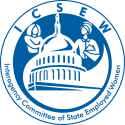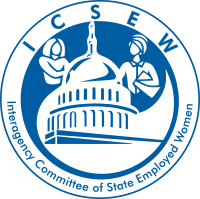Cracking the Code to Effective Resumes
By Rachel Friederich, ICSEW Communications Chair

Lonnie Spikes from the Department of Licencing talks about effective resume building at the ICSEW career fair.
When it comes to building an effective resume there’s no ‘one-size fits all’ template, according to Lonnie Spikes, Talent Acquisition Manager for the Department of Licensing.
Spikes gave a presentation on effective resume-building at the ICSEW’s career fair May 21.
Spikes gave some insights to how applicants are screened for Washington state government jobs. He said unlike Federal government jobs, which are often screened by computer programs, trained job recruiters are the first ones to take a look at a candidate’s application package.
He said to tailor your resume to the job description, based on the skills you have. He says people can sometimes forget putting skills on their resumes because they’re so used to it, it’s second-nature to them. (For example, word processing skills you learned in elementary school).
“Give yourself credit for your skills, even if they seem like putting on a shoe,” Spikes said.
He said combing through all your files– no matter how long they may have been sitting in a pile untouched—can provide useful information to a potential employer about your skills. Past award certificates, evaluations, reports, etc. can be a treasure trove of material to include in a resume.
Other bits of information Spikes shared:
- Always bring a portfolio of work with you to formal interviews, informational interviews, job fairs, etc. You always want to be able to demonstrate your work.
- Turn in your application as soon as possible. You are competing for jobs on a global market. You’re not just competing against your next door neighbor. The majority of companies’ job posting and application process is done online, so you’re competing with potential job candidates from all over the world.
- Spikes said it’s not unheard of for recruiters at the state level to receive several hundred applications for a single position. However, recruiters are limited to advancing just 20 applications to the initial screening process. Make sure to tailor your resume to make sure yours is in that batch of 20.
- If you see a job listing with a recruiter’s name, don’t be afraid to contact the recruiter. They can often help answer questions about a position.
- Length: There’s no magic formula for the appropriate length of a resume. Just make sure it’s long enough to properly address your qualifications that are relevant to the position.
Minutes from the May 21 meeting can be viewed here.

